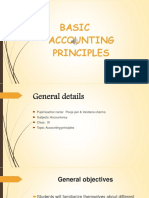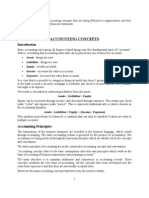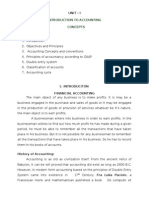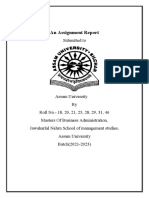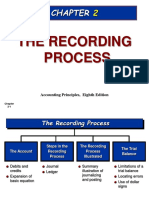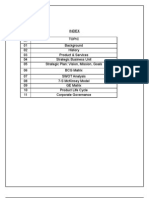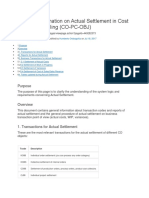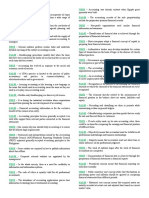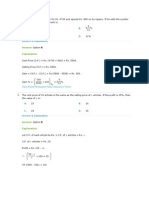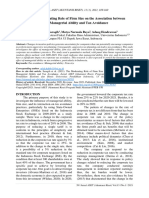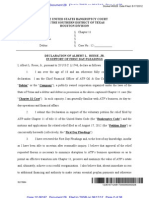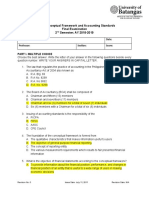Accounting Principles are divided in two parts:
3 Conventions and 11 concepts:
• Conventions/Assumptions
• Convention of full disclosure: This concept implies that financial
statements should disclose all material information which is
required by the proprietor and other users to assess the final
accounts of the business unit
• Convention of conservation: This principle is nothing but a
formal expression of the maxim “Anticipate no profits and provide
for all possible losses.” In other words, it considers all possible
losses but ignores all possible profits.
• Convention of materiality: This principle emphasizes that only
those transactions should be recorded which are material or
relevant for the determination of income from the business. All
immaterial facts should be ignored.
• Concepts
• Going concern concept: This concept assumes that every
business has a long and indefinite life. Since financial statements
are prepared on the basis of this concept, all fixed assets are shown
in the books at their cost ignoring their market value.
• Consistency concept: This principle requires that accounting
practices, methods and techniques used by a business unit should
be consistent. A business unit can adopt any accounting practice,
but once a particular practice is chosen, it must be used for a
number or years
• Accrual concept: According to this concept income is treated as
being earned on the date on which it is realized i.e. the date on
which goods or services are transferred to the customers. Since this
exchange of goods or services may be for cash or on credit, it is not
important whether cash has actually been received or not.
• Business Entity concept: This concept considers a business unit
as a separate entity. Business and businessman are two separate
entities and all the business transactions are recorded in the books
of accounts from business point of view.
• Money measurement concept: According to this concept only
those transactions are recorded in the books of accounts which can
be expressed in monetary terms. The non-financial or non-monetary
transactions do not find any place in the accounting records. Money
is the common denominator to denote the value of the various
assets of diverse nature to give a meaningful total of these assets.
�• Accounting period: According to this concept the long life of
business is divided into justifiable accounting periods so as to help
businessman to know the results of his investment during each such
period. This period is known as accounting period and the length of
this period depends on the nature of business. Accounting period
may be either a calendar year (From January 1 to December 31) or
the fiscal year of the Govt. (April 1 to March 31)
• Cost concept: According to this concept all fixed assets are
recorded in the books at cost i.e. the price paid to acquire them.
Any subsequent increase or decrease in their value will not be
shown in the records except the depreciation of these assets. In
subsequent years, therefore fixed assets are shown at cost less
depreciation provided on them up to date. Continuous charging of
depreciation on the asset will ultimately eliminate the asset from
the books.
• Dual aspect concept: This Concept also known as equivalence
concept signifies that every business transaction has two fold
effects or every transaction affects at least two accounts. This
concept is, in fact, the base on which Double Entry System of Book-
Keeping is based. According to this principle, every debit has a
corresponding credit.
• Revenue concept: Revenue is recognized when the right to
receive is established. Revenue has been considered to be realized
when a transaction has been entered into and obligation to receive
the amount is established.
• Matching concept: According to this concept assets owned by the
business must be equal to the funds contributed by the
businessman in the form of capital. These days when business is to
be carried on a large scale, funds may be borrowed from third
parties to supplement the funds contributed by the proprietor.
• Objectivity concept: all the accounting entries must be supported
with evidence like bill, cash memo or voucher
























